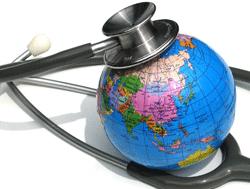 We’ve all been there before. It’s day two of your trip and you have horrible food poisoning. Or you’re lobster red after the first day at the beach. As much as we plan a trip down to the last detail, we must also accept that sometimes things end up going down the tubes.
We’ve all been there before. It’s day two of your trip and you have horrible food poisoning. Or you’re lobster red after the first day at the beach. As much as we plan a trip down to the last detail, we must also accept that sometimes things end up going down the tubes.
While you can’t always avoid illness or injury, you can take extra safety precautions while traveling. While some health concerns are more serious than others, here are the most common ones that occur among travelers:
Gastrointestinal Problems: Affecting 20 to 60 percent of travelers, digestive issues are most common in countries where food and water hygiene are important, such as Mexico. Prior to your trip, be sure to research the local water and food safety. Contaminated water often causes traveler’s diarrhea and it can also spread diseases such as cholera, hepatitis A, and typhoid. Check to see if tap water is unsafe for drinking. Otherwise, play it safe with boiled, bottled, or chemically purified or filtered water. You should also avoid adding ice to your drinks, brushing your teeth with tap water, and even certain foods that may be contaminated, such as salads, raw fruits and veggies, and street food.
Insect Bite-Related Health Issues: Mosquitoes, flies, lice, bed bugs, and mites are all capable of spreading diseases such as malaria, dengue, yellow fever, typhus, and Lyme disease. To prevent potentially harmful bug bites, stay in an accommodation that’s air-conditioned (if possible). To keep bugs out of your room, use a bed net and hang mesh screens on doors and windows. When outside, wear insect repellent and light colored, loose fitting clothes to deter bugs. Be sure to cover up at night, since that is when mosquitoes carrying malaria are most active.
Accidents and Injuries: The best way to prevent accidents and injuries is to use common sense and take basic safety precautions. Read up on the local road and transportation safety, avoid traveling alone, and be aware of your surroundings at all times.
Sexually Transmitted Infections: Yes, this is an extremely common health risk among travelers, for, well, obvious reasons. The best way to avoid STIs? Use a condom or practice abstinence while you’re away.
Sunburn: Practice general sun safety to prevent sunburn from ruining your trip. Wear a broad-spectrum sunscreen that has an SPF of at least 15 and re-apply every two hours. Try to stay out of the sun during the middle of the day and be sure to wear a hat and light colored, loose fitting clothing.
To further protect yourself from health risks, pay a preventative visit to your doctor for any required vaccinations and/or medications, such as malaria pills.
Photo from infectioncontrolsociety.org.

